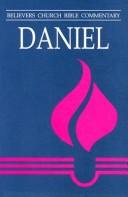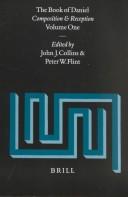| Listing 1 - 10 of 47 | << page >> |
Sort by
|

ISBN: 0836136632 0585234337 9780585234335 9780836136630 Year: 1994 Publisher: Scottdale, Pennsylvania : Herald Press,
Abstract | Keywords | Export | Availability | Bookmark
 Loading...
Loading...Choose an application
- Reference Manager
- EndNote
- RefWorks (Direct export to RefWorks)
Book
ISBN: 0805496890 9780805496895 9780805496871 0805496874 Year: 2017 Publisher: Nashville, Tennessee
Abstract | Keywords | Export | Availability | Bookmark
 Loading...
Loading...Choose an application
- Reference Manager
- EndNote
- RefWorks (Direct export to RefWorks)
Book
ISBN: 113985481X 110806244X Year: 1889 Publisher: Place of publication not identified : Cambridge : publisher not identified, Cambridge University Press
Abstract | Keywords | Export | Availability | Bookmark
 Loading...
Loading...Choose an application
- Reference Manager
- EndNote
- RefWorks (Direct export to RefWorks)
This translation of an Arabic commentary by Jephet ibn Ali (fl. late tenth century) was first published in 1889. Based on ten manuscripts, the text was carefully edited and rendered into English by David Samuel Margoliouth (1858-1940), Laudian Professor of Arabic at Oxford. Jephet was a leading Karaite scholar who wrote a number of biblical commentaries in his native Arabic. This was one of his mature works and perhaps the best example of his critical and exegetical powers. Based on the historical allusions in the commentary, Margoliouth estimated that it was composed between 990 and 1010. The work includes the Arabic text, with critical apparatus and a useful glossary of key words. Fiercely polemical against Islam, Christianity and Rabbinic Judaism, the commentary has greatly contributed to our understanding of tenth-century religious controversies. It remains an important work of Karaite literature.
Book
ISBN: 1577997751 9781577997757 9781577997740 Year: 2016 Publisher: Bellingham, WA
Abstract | Keywords | Export | Availability | Bookmark
 Loading...
Loading...Choose an application
- Reference Manager
- EndNote
- RefWorks (Direct export to RefWorks)

ISSN: 00835889 ISBN: 9004122028 9004116753 9004122001 9004276084 9004276092 9789004116757 Year: 2001 Volume: II, 1-2 83, 1-2 Publisher: Leiden Brill
Abstract | Keywords | Export | Availability | Bookmark
 Loading...
Loading...Choose an application
- Reference Manager
- EndNote
- RefWorks (Direct export to RefWorks)
In this collection of new essays, more than thirty leading scholars from Europe, North America and Israel examine the Composition and Reception of Daniel in eight sections: Review of Scholarship and Context (J.J. Collins, M. Knibb); Near Eastern Milieu (K. van der Toorn, S. Paul, J. Walton); Interpretation of Specific Passages (D. Dimant, R. Kratz, A. Lacocque, E. Haag, J.-W. van Henten); Social Setting (R. Albertz, S. Beyerle, L. Grabbe, P. Davies, D. Smith-Christopher); Literary Context, including Qumran (J.-W. Wesselius, G. Boccaccini, P.W. Flint, L. Stuckenbruck, E. Eshel, J. Hobbins); Reception in Judaism and Christianity (K. Koch, C. Rowland, U. Gleßmer, C.A. Evans, J.D.G. Dunn, M. Henze); Textual History (E. Ulrich, A.A. Di Lella, K. Jenner) and Theology of Daniel (J. Goldingay, J. Barton, J. Lust). This is the second volume to appear (following Writing and Reading the Scroll of Isaiah. Studies of an Interpretative Tradition ) in the collection The Formation and Interpretation of Old Testament Literature , part of the series Supplements to Vetus Testamentum . Further volumes in preparation on the composition and reception of Old Testament books include Genesis, Leviticus, Kings, Psalms, and Proverbs. This publication has also been published in paperback, please click here for details.
Book
ISBN: 9783110330861 3110330865 9783110330991 9783110389975 3110389975 3110330997 Year: 2016 Volume: 455 Publisher: Berlin De Gruyter
Abstract | Keywords | Export | Availability | Bookmark
 Loading...
Loading...Choose an application
- Reference Manager
- EndNote
- RefWorks (Direct export to RefWorks)
The volume contains eight original studies, each of which focuses on a different chapter or central passage in Daniel and offers a new interpretation or reading of the passage in question. The studies span the Danielic tales and apocalypses, offering innovative analyses that often challenge the scholarly consensus regarding the exegesis of this book. The eight chapters relate to Daniel 1, 2, 4, 5, 7, 9, Susanna, and the conception of angelology in Daniel. The studies are all based on careful textual analysis, including comparison between the Hebrew/Aramaic and Greek versions (especially regarding Daniel 4–6), and, in each case, the larger arguments are built upon solid philological foundations. Many of the insights proposed in this volume are based upon the realization that the authors of Daniel were frequently interpreters of earlier biblical books, and that the identification of these intertextual clues can be the key to unlocking the meaning of these texts. In this sense, Daniel is similar to other contemporaneous works, such as Jubilees and Qumran literature, but the extent of this phenomenon has not been fully appreciated by scholars of the book. This volume therefore contributes to the appreciation of Daniel as both the latest book in the Hebrew Bible, and a significant work in the landscape of Second Temple Judaism.
Bible --- Criticism, interpretation, etc. --- Bible. --- Daniel (Book of the Old Testament) --- Daniyel (Book of the Old Testament) --- Taniel (Book of the Old Testament) --- Daniel. --- bible. --- exegesis. --- text. --- RELIGION / Biblical Criticism & Interpretation / Old Testament.
Book
ISBN: 9789004331297 9004331298 9789004331310 900433131X Year: 2017 Volume: 176 Publisher: Leiden Brill
Abstract | Keywords | Export | Availability | Bookmark
 Loading...
Loading...Choose an application
- Reference Manager
- EndNote
- RefWorks (Direct export to RefWorks)
"In The Danielic Discourse on Empire in Second Temple Literature, Alexandria Frisch asks: how did Jews in the Second Temple period understand the phenomenon of foreign empire? In answering this question, a remarkable trend reveals itself--the book of Daniel, which situates its narrative in an imperial context and apocalyptically envisions empires, was overwhelmingly used by Jewish writers when they wanted to say something about empires. This study examines Daniel, as well as antecedents to and interpretations of Daniel, in order to identify the diachronic changes in perceptions of empire during this period. Oftentimes, this Danielic discourse directly reacted to imperial ideologies, either copying, subverting, or adapting those ideologies. Throughout this study, postcolonial criticism, therefore, provides a hermeneutical lens through which to ask a second question: in an imperial context, is the Jewish conception of empire actually Jewish?"
229*232 --- 229*232 Visioen van Daniel --- Visioen van Daniel --- Bible --- Holy Scriptures (Bible) --- Criticism, interpretation, etc. --- Biblia --- Bible. --- Daniel (Book of the Old Testament) --- Daniyel (Book of the Old Testament) --- Taniel (Book of the Old Testament)
Book
ISBN: 3290147363 9783290147365 Year: 1984 Volume: 23 Publisher: Zürich Theologischer Verl.
Abstract | Keywords | Export | Availability | Bookmark
 Loading...
Loading...Choose an application
- Reference Manager
- EndNote
- RefWorks (Direct export to RefWorks)
Book
ISSN: 04088298 ISBN: 3161451430 9783161451430 Year: 1986 Volume: 28 Publisher: Tübingen Mohr Siebeck
Abstract | Keywords | Export | Availability | Bookmark
 Loading...
Loading...Choose an application
- Reference Manager
- EndNote
- RefWorks (Direct export to RefWorks)
Bible --- Criticism, interpretation, etc --- History --- 224.5 --- Toevoegsels bij Daniel: Oratio Azariae; Susanna; Bel et Draco --- Bible. --- Daniel (Book of the Old Testament) --- Daniyel (Book of the Old Testament) --- Taniel (Book of the Old Testament) --- Criticism, interpretation, etc.
Book
ISBN: 1850755515 9781850755517 Year: 1995 Volume: 198 Publisher: Sheffield Sheffield academic press
Abstract | Keywords | Export | Availability | Bookmark
 Loading...
Loading...Choose an application
- Reference Manager
- EndNote
- RefWorks (Direct export to RefWorks)
| Listing 1 - 10 of 47 | << page >> |
Sort by
|

 Search
Search Feedback
Feedback About UniCat
About UniCat  Help
Help News
News